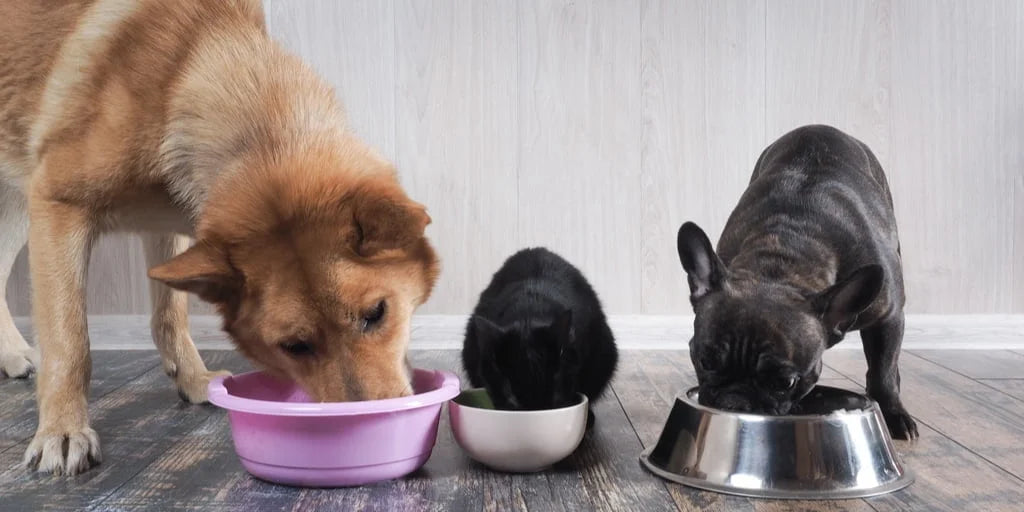As devoted pet owners, it's natural to express affection through feeding. However, overindulgence can lead to significant health issues for our furry companions. Overfeeding is a prevalent concern that can result in obesity, decreased lifespan, and various health complications. Understanding how to prevent overfeeding, recognize its signs, and maintain your pet's optimal health is essential.
Identifying Overfeeding in Your Pet
Body Condition Assessment
A practical method to evaluate your pet's weight is the Body Condition Score (BCS). This visual and tactile assessment helps determine if your pet is underweight, overweight, or at an ideal weight. Typically, a healthy pet will have a discernible waistline when viewed from above and a slight abdominal tuck from a side view. You should be able to feel your pet's ribs with minimal pressure; difficulty in feeling the ribs or a lack of a defined waist may indicate excess weight.
Constant Hunger Signals
While some pets are naturally food-motivated, incessant begging for food or treats might suggest that their regular meals are too large. If your pet seems perpetually hungry despite consistent feeding, it could be due to habitual overfeeding rather than genuine hunger.
Decreased Energy and Activity
Overweight pets often exhibit reduced activity levels. If your pet becomes easily fatigued or shows less interest in play, it could be a sign of carrying extra weight, often resulting from overfeeding.
Unexplained Weight Gain
Regularly monitoring your pet's weight is crucial. Even slight, consistent weight increases can indicate overfeeding, especially if there's no corresponding rise in activity levels.
Strategies to Prevent Overfeeding
Adhere to Feeding Recommendations
Consult the feeding guidelines provided on your pet's food packaging. These suggestions are based on factors like weight, age, and activity level. Begin with the recommended amount and adjust according to your pet's specific needs. For instance, Open Farm pet foods offer detailed feeding instructions that serve as an excellent starting point.
Accurate Portion Measurement
Utilize a measuring cup or kitchen scale to ensure precise feeding amounts. Estimating portions can easily lead to overfeeding. By measuring, you guarantee your pet receives the appropriate daily caloric intake.
Moderate Treat Intake
Treats should constitute no more than 10% of your pet's daily calories. It's easy to overlook how quickly treats add up. Opt for low-calorie, nutritious treats and keep portions small.
Establish Regular Feeding Schedules
Setting specific feeding times helps control your pet's calorie consumption. Avoid leaving food out all day (free-feeding), as it makes it challenging to monitor intake.
Select High-Quality Nutrition
The quality of food is as important as the quantity. Foods made with wholesome, natural ingredients are more nutritionally dense, meaning your pet may feel fuller with smaller amounts. Open Farm offers a range of ethically sourced, nutrient-rich foods that can help maintain your pet's health while keeping them satisfied.
Addressing Overweight Pets
If you suspect your pet is overweight, take proactive steps to prevent further health issues:
Consult a Veterinarian
Begin by discussing your concerns with your vet. They can recommend a weight loss plan tailored to your pet's needs, which may involve dietary adjustments, increased exercise, or switching to a lower-calorie food.
Implement a Weight Management Diet
Your vet might suggest a specialized diet that's lower in calories but still provides essential nutrients. Open Farm's healthy pet food options offer balanced nutrition to help your pet shed excess weight.
Enhance Physical Activity
Gradually increase your pet's exercise routine to help burn more calories. Start with short, frequent play sessions or walks, and slowly extend the duration as your pet's endurance improves.
Regular Monitoring
Schedule regular weigh-ins and check-ups with your vet to ensure your pet is losing weight at a healthy rate. Adjust their diet and exercise plan as needed, based on professional guidance.
Overfeeding, though often well-intentioned, can have serious consequences for your pet's health. By following portion guidelines, controlling treat intake, and choosing high-quality food, you can help your pet maintain a healthy weight and enjoy a long, active life. Stay vigilant about their body condition, be mindful of feeding practices, and consult your vet if you have concerns.
For more insights on pet nutrition and wellness, explore Open Farm's blog or browse their selection of premium, ethically sourced pet foods.

